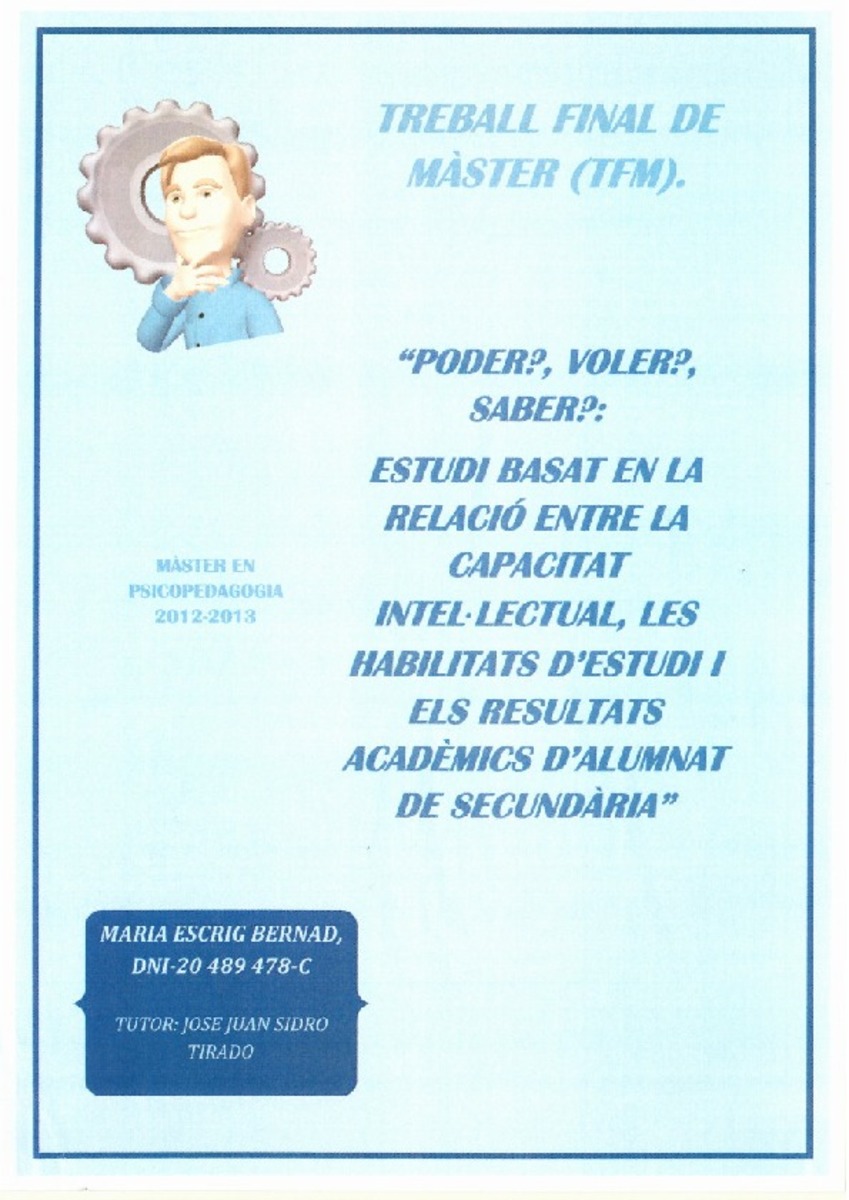Mostrar el registro sencillo del ítem
Poder? Voler? Saber?: estudi basat en la relació entre la capacitat intel·lectual, les habilitats d'estudi i els resultats acadèmics d'alumnat de secundària
| dc.contributor | Sidro Tirado, José Juan | |
| dc.contributor | Universitat Jaume I. Departament d'Educació | |
| dc.contributor.author | Escrig Bernad, Maria | |
| dc.date.accessioned | 2014-01-27T11:57:18Z | |
| dc.date.available | 2014-01-27T11:57:18Z | |
| dc.date.issued | 2013 | |
| dc.identifier.uri | http://hdl.handle.net/10234/81367 | |
| dc.description.abstract | This project has been a study based on the relationship between intellectual ability of the students , skills and study skills they have acquired and academic results . The sample consisted of 18 students in the second ESO IES Castillo and Vicente Castelló Domenech who have had past the test IGF ( General Intelligence Factor ) and CHTE questionnaire ( Questionnaire of Study Habits and Techniques ) also has been used academic results of students in June . The work consisted in comparing the results of the IGF and CHTE with each student's academic results of the second class of secondary school in order to confirm or reject the hypothesis : better academic results when more brainpower and better skills and study skills . Only in 27.78 % of cases confirms the proposed hypothesis . After analyzing the results , we propose an action to carry out during the course of the first assessment . This is a workshop for learning and improving skills and study skills in order to improve the academic performance of students. | ca_CA |
| dc.description.abstract | En aquest projecte, s'ha fet un estudi basat en la relació que existeix entre la capacitat intel·lectual de l'alumnat, les habilitats i tècniques d'estudi que han adquirit i els resultats acadèmics. La mostra ha constat de 18 alumnes de segon d'ESO de l'IES Vicent Castell i Domènech de Castelló als quals se'ls ha passat el test IGF (Inteligencia General i Factorial) i el cuestionari CHTE (Cuestionario de Habitos y Tecnicas de Estudio) a més a més s'ha fet ús dels resultats acadèmics de l'alumnat al mes de juny. El treball ha consistit en comparar els resultats de l'IGF i el CHTE amb els resultats acadèmics de cada alumne de la classe de segon d'ESO per tal de confirmar o rebutjar l'hipòtesi plantejada: millors resultats acadèmics quan més capacitat intel·lectual i millors habilitats i tècniques d'estudi. Només en el 27,78% dels casos es confirma l'hipòtesi proposada. Una vegada analitzats els resultats, s'ha plantejat una proposta d'acció per tal de dur-la a terme al llarg de la primera avaluació del curs. Es tracta d'un taller d'aprenentatge i millora d'habilitats i tècniques d'estudi amb l'objectiu de millorar el rendiment acadèmic de l'alumnat. | ca_CA |
| dc.format.extent | 103 p. | ca_CA |
| dc.format.mimetype | application/pdf | ca_CA |
| dc.language.iso | cat | ca_CA |
| dc.publisher | Universitat Jaume I | ca_CA |
| dc.rights | Attribution-ShareAlike 4.0 Spain | * |
| dc.rights.uri | http://creativecommons.org/licenses/by-sa/4.0/ | * |
| dc.subject | Brainpower | ca_CA |
| dc.subject | Study skills | ca_CA |
| dc.subject | Academic results | ca_CA |
| dc.subject.other | Aprenentatge, Aptitud per a l' | |
| dc.subject.other | Estudi, Tècniques d' | |
| dc.subject.other | Mètodes d'estudi | |
| dc.title | Poder? Voler? Saber?: estudi basat en la relació entre la capacitat intel·lectual, les habilitats d'estudi i els resultats acadèmics d'alumnat de secundària | ca_CA |
| dc.type | info:eu-repo/semantics/masterThesis | ca_CA |
| dc.rights.accessRights | info:eu-repo/semantics/openAccess | ca_CA |
Ficheros en el ítem
Este ítem aparece en la(s) siguiente(s) colección(ones)
-
TFM: Master Universitari en Psicopedagogia [231]
SAW020, SAW021, SAW022, SAW023








